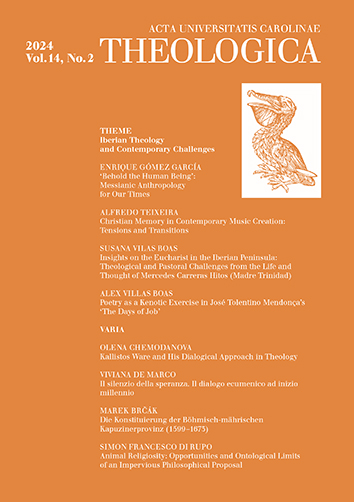AUC Theologica je recenzovaný odborný teologický časopis, který vychází dvakrát ročně. S výjimkou slavistických témat, recenzí a zpráv zveřejňuje příspěvky pouze ve světových jazycích – v angličtině, němčině, francouzštině a italštině.
Časopis se zaměřuje na širokou škálu teologických disciplín, jako je například systematická teologie, biblistika, patristika, pastorální a spirituální teologie, katechetika nebo církevní historie. V rámci nich se snaží reflektovat současná témata, která často vyžadují interdisciplinární přístup. Vítáme také teologické články, které se dotýkají jiných akademických oborů, jako je například filosofie, sociologie, literární věda či vědy přírodní.
Každé číslo se skládá ze dvou sekcí. Tematická sekce obsahuje články s jednotným zaměřením. V sekci s názvem „Varia“ publikujeme původní studie na různá aktuální teologická témata. Všechna čísla časopisu jsou dostupná v režimu Open Access.
AUC THEOLOGICA, Vol 4 No 1 (2014), 133–151
Adam. Příběh prvního člověka v knize Genesis a v Koránu
[Adam in the Book of Genesis and in the Qur’an]
Mlada Mikulicová
DOI: https://doi.org/10.14712/23363398.2015.19
zveřejněno: 02. 10. 2014
Abstract
In both books Adam is presented as a prototypical man created from physical elements and endowed with divine inspiration that makes him capable of rational actions. While Genesis narrates the story of Adam from his creation to his death, stressing chronology and future development in history, the Qur’an’s rendering is fragmentary. Of vast underlying popular traditions on Adam and Eve, Genesis previews the history of God’s covenant and salvific action towards humankind while the Qur’an persists on the theme of human disobedience and God’s absolute governance. Despite common themes as the createdness of man, his superiority over the rest of the creation, the complementary nature of human being as man and woman, the loss of happiness through disobedience to God’s law, the two stories differ in interpretation. While the acceptance of evil into human heart is reflected as voluntary in Genesis, the Qur’an finds excuse in the revolt of Satan who is shown in a more active role than man. Eliminating the notions of man as the image of God, and the final abolishment of evil, the Qur’an uses Adam’s story to demonstrate the principal axioms of Islamic doctrine: God must be obeyed and Satan’s lures avoided else man will not attain the Garden; Adam is a prototypal prophet, informing of these truths. Adam and Eve, according to the narration of the Book of Genesis, represent human existence in the drama of knowing evil and distress, hiding from God, and hearing his promise of future salvation that begins to unroll in their progeny. V biblicke knize Genesis i v Koranu je Adam představen jako prototyp člověka stvořeneho z fyzickych prvků a „Božiho vdechnuti“ racionality. Biblicke vypravěni je chronologicky přiběh, Koran zmiňuje pouze některe časti sparsatim v deseti různych surach. Genesis jakožto prolog k biblickemu celku vybira tradični latky k dokumentaci Božich dějin spasy, zatimco Koran eliminuje všechno, co nesouvisi s centralni zvěsti o poslušnosti Bohu, pokani a modelu proroka jako zvěstovatele Boži jedinosti. Temata Adamova přiběhu se namnoze shoduji, avšak interpretace se liši, napřiklad v otazce Božiho obrazu, přijeti zla, aktivni či pasivni role Evy, genealogie a vyustěni dějin.
klíčová slova: Genesis; Qur’an; Adam; Apocrypha; Pseudoepigrapha; Stories of Islamic prophets Genesis; Korán; Adam; apokryfy; pseudoepigrafy; dějiny islámských proroků

Adam. Příběh prvního člověka v knize Genesis a v Koránu is licensed under a Creative Commons Attribution 4.0 International License.
148 x 210 mm
vychází: 2 x ročně
cena tištěného čísla: 100 Kč
ISSN: 1804-5588
E-ISSN: 2336-3398
